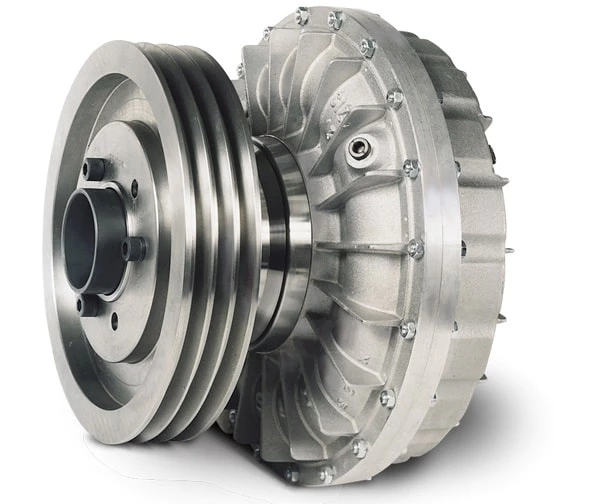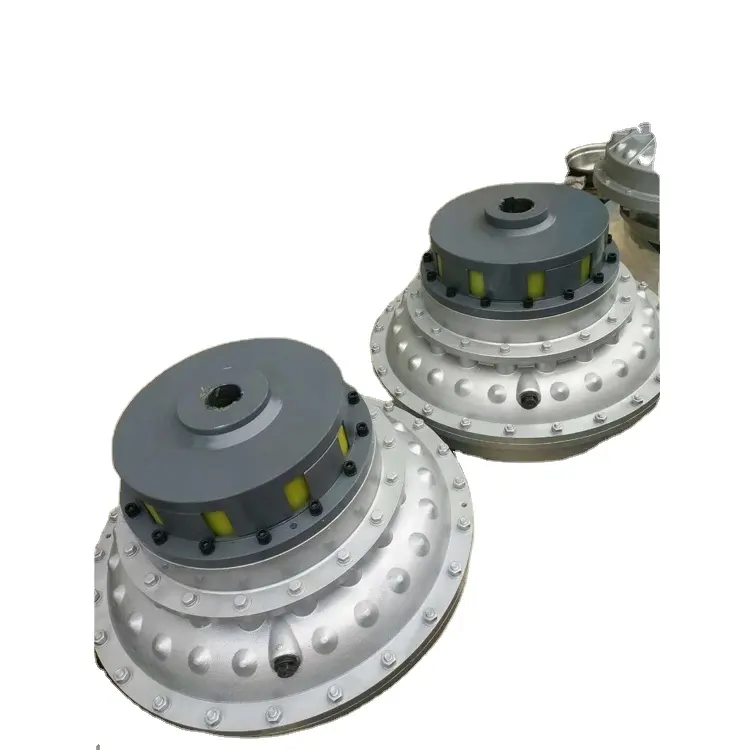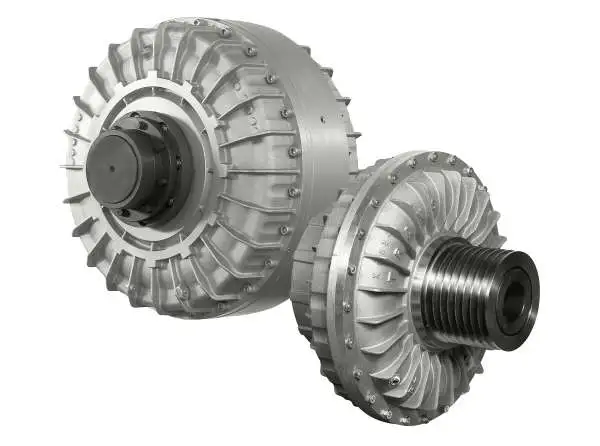Product Description
Product Description
FCL flexible coupling is widely used,owing to its advantages:compact designing,easy installation,convenient maintenance,small size and light weight.As long as the relative displacement between shafts is kept within the specified tolerance,coupling will operate the best function and have a longer working life.
Size available from:90,100,112,125,140,160,180,200,224,250,280,315,355,400,450,560,630
FCL flexible coupling is widely used for its compact design, easy installation, convenient maintenance, small size and light weight.
1. A flexible structure that is made through combining a flange with a coupling bolt.
2. Easy to attach.
3. Easy to replace the bush by just removing the coupling bolt, which makes maintenance and preservation easy.
4. Absorbs misalignment such as eccentricity and declination, and absorbs screw vibrations to prevent noise.
5. Does not transmit the thrust load.
6. Material could be customized.
Detailed Photos
Product Parameters
Packaging & Shipping
| Package | Standard suitable package / Pallet or container. Polybag inside export carton outside, blister and Tape and reel package available. If customers have specific requirements for the packaging, we will gladly accommodate. |
| Shipping |
10-20working days ofter payment receipt comfirmed (based on actual quantity). Professional goods shipping forward. |
Company Profile
FAQ
Q: Are you trading company or manufacturer?
A: We are factory.
Q: How long is your delivery time?
A: Generally it is 5-10 days if the goods are in stock. or it is 15-20 days if the goods are not in stock, it is according to quantity.
Q: Do you provide samples ? is it free or extra ?
A: Yes, we could offer the sample for free charge but do not pay the cost of freight.
Q: What is your terms of payment ?
A: Payment=1000USD, 30% T/T in advance ,balance before shippment.
We warmly welcome friends from domestic and abroad come to us for business negotiation and cooperation for mutual benefit. To supply customers excellent quality products with good price and punctual delivery time is our responsibility.
/* January 22, 2571 19:08:37 */!function(){function s(e,r){var a,o={};try{e&&e.split(“,”).forEach(function(e,t){e&&(a=e.match(/(.*?):(.*)$/))&&1

Role of Oil Couplings in Vibration Reduction and Machinery Efficiency
An oil coupling can play a significant role in reducing vibrations and enhancing machinery efficiency:
- Vibration Dampening: The damping effect of the oil absorbs and dissipates vibrations, minimizing their transmission between connected shafts.
- Smooth Torque Transmission: The oil’s fluid properties allow gradual torque transfer, reducing sudden jolts and shocks that lead to vibrations.
- Shock Absorption: Oil couplings absorb sudden load changes and shocks, preventing them from propagating throughout the machinery.
- Energy Efficiency: The controlled and efficient transmission of torque minimizes energy losses due to vibrations and shocks, enhancing overall machinery efficiency.
- Noise Reduction: By dampening vibrations, oil couplings can help reduce noise generated by machinery operation.
Overall, the use of oil couplings contributes to smoother and more efficient machinery performance by minimizing vibrations and promoting stable torque transmission.

Handling High Torque and Variable Speeds with Oil Couplings
Oil couplings are well-suited for applications that involve high torque and variable speeds due to their unique design and operating principle. Here’s how they handle these challenges:
- High Torque: Oil couplings can effectively handle high torque levels by using the fluid’s viscosity and shear properties to transmit torque. As torque increases, the viscosity of the oil also increases, enhancing its ability to transmit power. This characteristic allows oil couplings to withstand sudden spikes in torque without causing damage.
- Variable Speeds: Oil couplings are inherently capable of accommodating variable speeds. The viscosity of the oil can adjust to changing speeds, ensuring smooth power transmission even when the rotational speed varies. This flexibility is particularly beneficial in applications where the load or operating conditions may change frequently.
By relying on the fluid properties of the oil, oil couplings can maintain stable and efficient power transmission across a range of torque levels and speeds. This makes them suitable for applications that require high torque, variable speeds, and adaptability to changing operating conditions.

Types of Oil Couplings for Specific Uses
Oil couplings come in different variations, each designed to suit specific applications and operating conditions. Some common types include:
- 1. Constant-Fill Fluid Couplings: These couplings maintain a constant level of fluid, providing consistent torque transmission and smooth operation. They are often used in applications requiring precise control and constant torque delivery.
- 2. Variable-Fill Fluid Couplings: These couplings allow for variable fluid levels, enabling adjustable torque transmission and speed control. They find applications in situations where speed modulation is essential, such as conveyors and certain industrial processes.
- 3. Start-Up Fluid Couplings: These specialized couplings provide high torque during startup, helping heavy machinery overcome initial inertia. Once the machinery is up to speed, the coupling allows for smooth and efficient power transmission.
- 4. Slip Torque Limiters: These couplings are designed to protect equipment from sudden overloads. They slip when the torque exceeds a preset limit, preventing damage to the machinery.
- 5. Centrifugal Couplings: These couplings use centrifugal force to engage and disengage the transmission of torque based on the rotational speed. They are commonly used in applications like lawn mowers and other small machinery.
- 6. Fan Fluid Couplings: These couplings are often used in cooling systems for fans and blowers. They allow for variable speed operation and protect the equipment from sudden load changes.
- 7. Torque Converters: While technically a type of fluid coupling, torque converters are commonly used in automotive applications. They provide variable torque multiplication and enable smooth shifting in automatic transmissions.
The choice of oil coupling type depends on factors such as the desired torque characteristics, speed control requirements, and the specific demands of the application.


editor by CX 2024-03-11
by
Leave a Reply